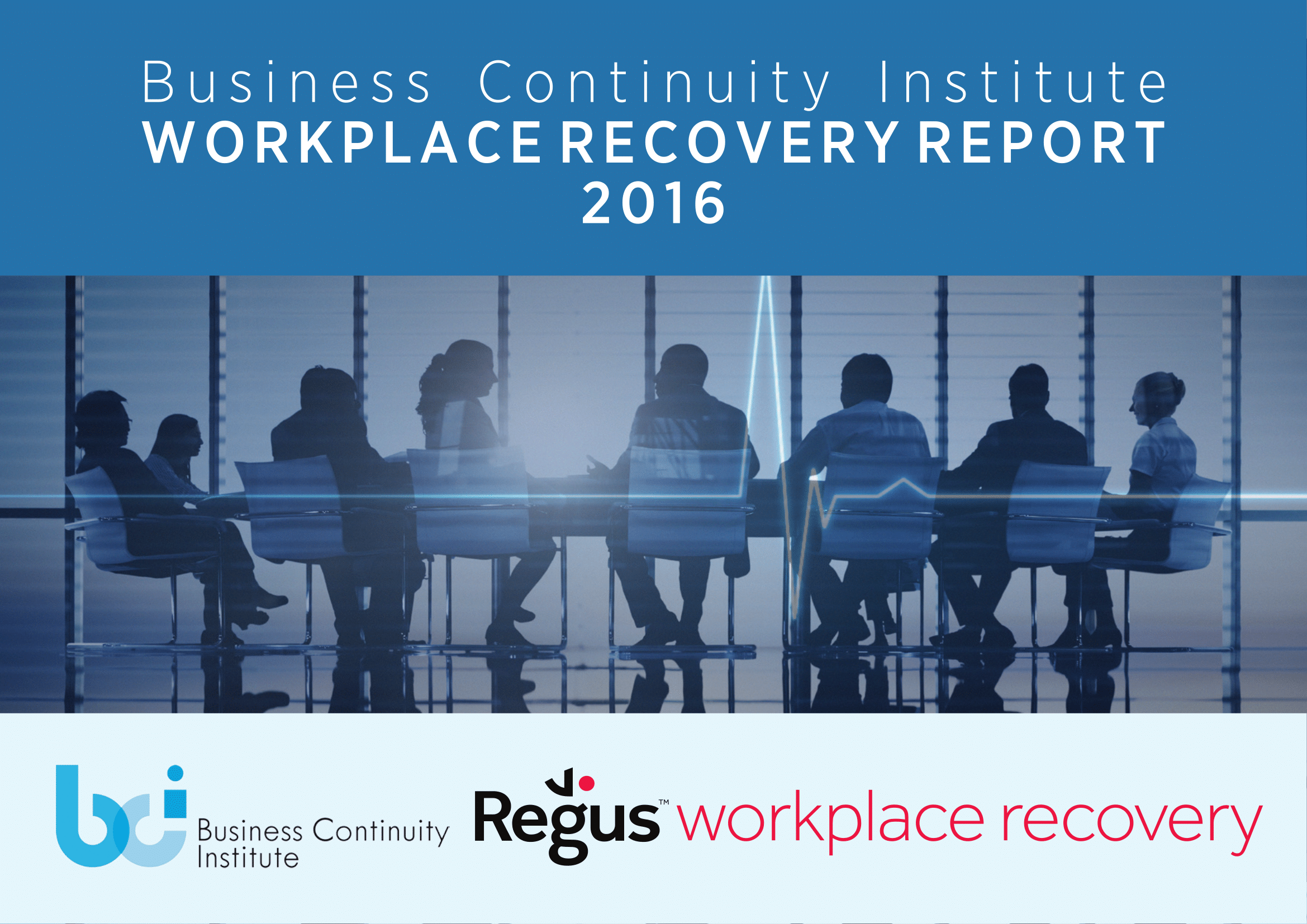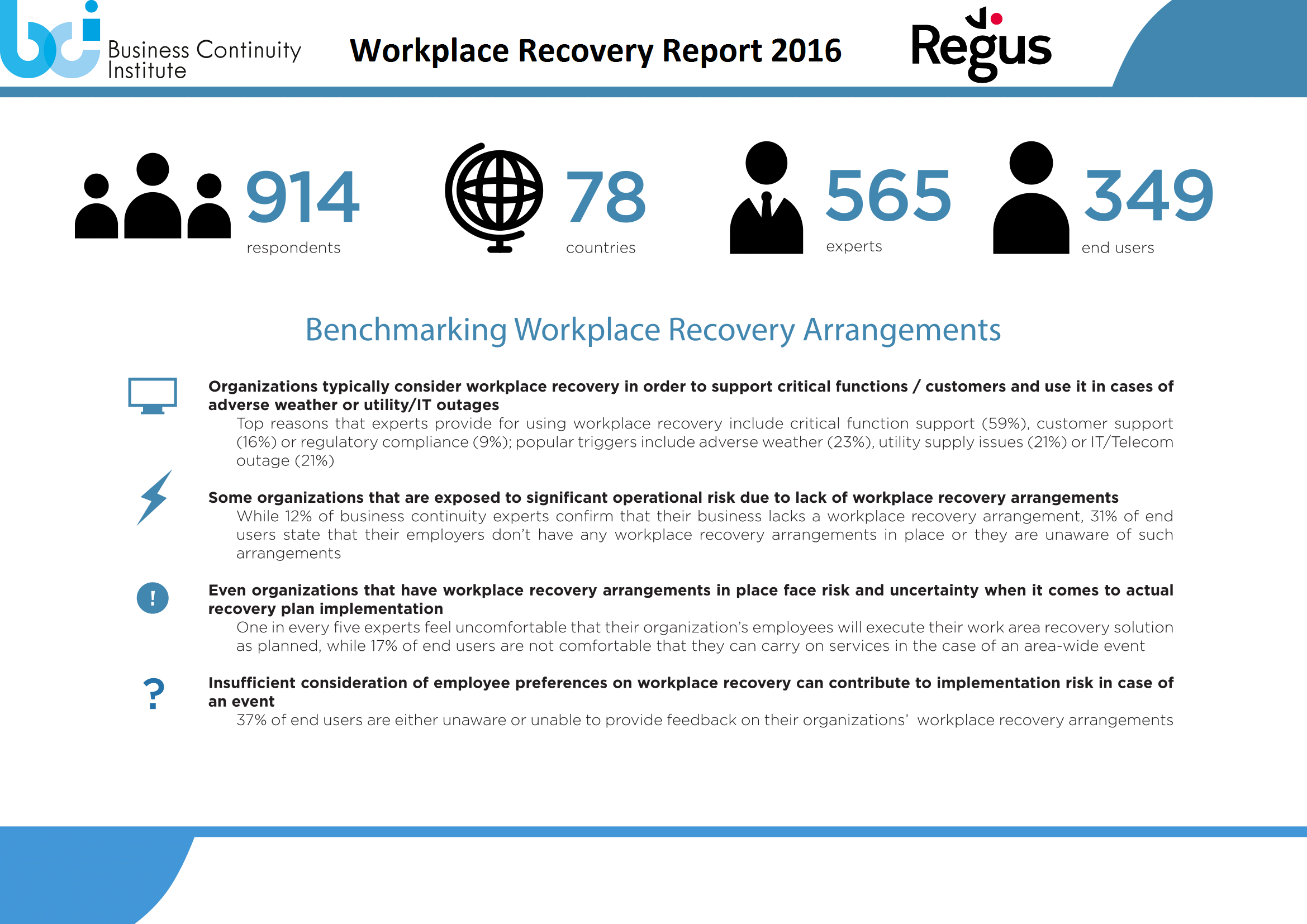Organizations lacking in workplace recovery options
Organizations exposed to significant risk due to lack of workplace recovery arrangements
Caversham, UK – 14th November 2016: A disconnect exists between business continuity professionals and end users when it comes to workplace recovery, according to a report published by the Business Continuity Institute and supported by Regus Workplace Recovery. The global study showed that, while only 12% of business continuity experts confirm their organization lacks a workplace recovery arrangement, 31% of end users claimed their employers don’t have any arrangements in place, or they are unaware of what they are.
The Workplace Recovery Report noted that even organizations with workplace recovery arrangements in place face risk and uncertainty when it comes to actual recovery plan implementation. One of every five experts feel uncomfortable that their organization’s employees will execute their work area recovery solution as planned, while 17% of end users are not comfortable they can carry on services in the case of an area-wide event.
Other findings of the report include:
- 37% of end users are either unaware or unable to provide feedback on their organization’s workplace recovery arrangements
- When deciding whether to work from an alternative location or from home, 32% of employees base their decision on ease of reaching alternative sites, while 20% focus on access to key enterprise systems, and 15% on having appropriate office infrastructure
- 26% of end users and 16% of experts feel that their organization’s business continuity priorities are not fully consistent with end user priorities
- Three-quarters of end users consider themselves critical, while 64% of experts believe only 20% of employees fall in this category
- Nearly four out of every five end users believe that there is a workplace recovery plan for them in the case of a disruption
- Work-from-home received less consideration as a workplace recovery approach from experts than from employees (26% vs 44%)
- 45% of end users are not happy to work from home for more than two weeks
The success of a chosen strategy such as workplace recovery depends on its proper implementation by staff, led by a capable business continuity or resilience team. The results reveal that experts have a basic level of confidence in the capability of staff to effectively execute workplace recovery during disruption. However, there are still gaps in awareness and implementation that need to be addressed.
The safety of employees remains a key priority for both workplace recovery experts and end users. This needs to be articulated by practitioners as it can facilitate staff buy-in into workplace recovery and enable embedding of business continuity throughout the organization. While priorities among experts and end users differ down the line, it is useful to communicate the importance of workplace recovery as a chosen strategy in appropriate language and along staff priorities.
Many employees also reveal a preference for working from home during an incident. This may be related to their desire to be close to their families during a crisis – a fact that should be strongly considered prior to selecting a single recovery facility that is a long distance from where the employee lives. This also carries significant implications to organizations such as ensuring that employees’ homes are conducive to such an arrangement from a business continuity, risk or health and safety perspective.
Patrick Alcantara DBCI, Senior Research Associate at the BCI and author of the report, commented: “When executed properly, in line with a holistic business continuity programme, workplace recovery can help build resilience within organizations. As part of business continuity strategy for many organizations, it is important to benchmark workplace recovery leading to better planning and implementation. The BCI Workplace Recovery Report aims to respond to practitioner demand and provide much needed insight in this subject, and we would like to thank Regus for supporting this work.”
Joe Sullivan, Managing Director for Workplace Recovery at Regus, commented: “With natural disasters impossible to predict and an increased risk from other world events, the need to have an established workplace recovery plan is greater than ever. We feel that when disaster strikes, ensuring your people have a secure and productive work environment is harder than recovering your IT. We need to understand how employees will react in the aftermath of a crisis – this research starts to take a look at these behaviours and it is the first of its kind to do so.”Press release distributed by Pressat on behalf of The Business Continuity Institute, on Monday 14 November, 2016. For more information subscribe and follow https://pressat.co.uk/
Workplace Recovery Business Continuity Risk Managment Business & Finance Charities & non-profits Government Manufacturing, Engineering & Energy Retail & Fashion
You just read:
Organizations lacking in workplace recovery options
News from this source:




